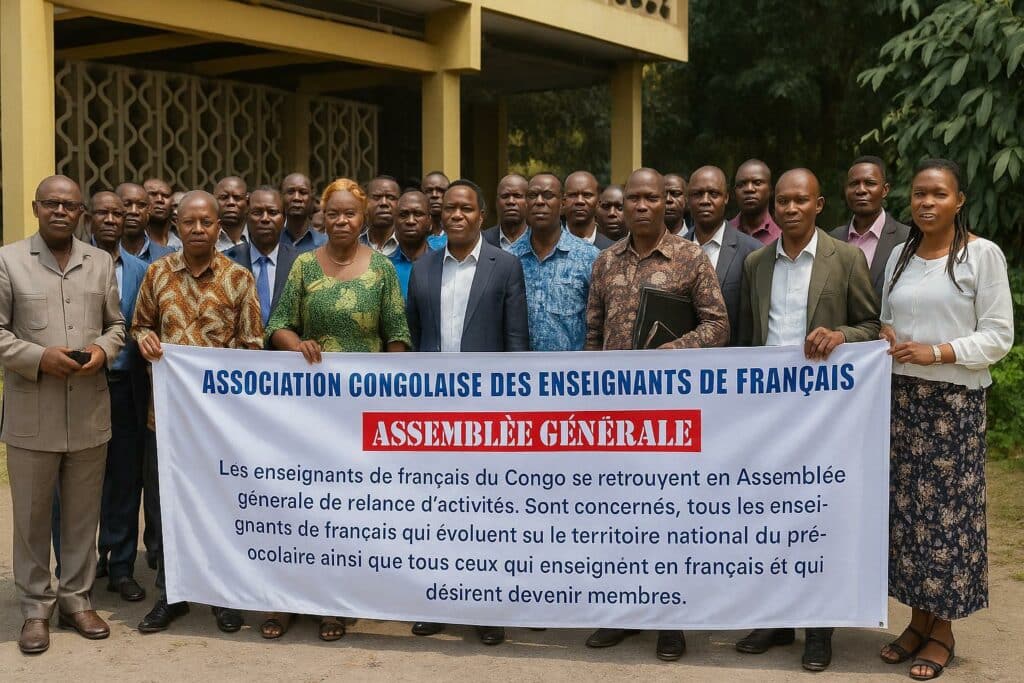A Dormant Association Awakens
In the lecture hall of Brazzaville’s National Institute for Pedagogical Research, an air of cautious enthusiasm prevailed as nearly fifty lecturers and schoolteachers gathered on 9 August 2025. Under the stewardship of Professor Omer Massoumou, the Congolese Association of French Teachers (ACEF) ratified a motion that brings the organisation back to public life after several silent years. The assembly’s objective was unequivocal: to revitalise an institution founded in 2001 to promote excellence in the teaching of French across all educational tiers. The timing is propitious. The Ministry of Primary, Secondary and Literacy Education has recently prioritised linguistic consolidation in its 2023-2027 roadmap, recognising that mastery of French remains a cornerstone of national cohesion and administrative efficiency. The relaunch of ACEF therefore dovetails neatly with state objectives and signals renewed professional solidarity among those who transmit the language of Molière.
Strategic Alignment with National Education Goals
Since the promulgation of the 2022 Education Orientation Act, the Congolese government has emphasised competency-based approaches, digital pedagogy and the reinforcement of core literacies. Officials in Brazzaville repeatedly underline that teacher associations act as privileged interlocutors when curricular reforms migrate from ministry desks to classroom reality. By committing itself to become “a laboratory of ideas and fieldwork”, as Professor Massoumou phrased it, ACEF positions itself as an auxiliary mechanism of public policy rather than a parallel lobby. Sources within the Directorate-General for Pedagogical Innovation indicate that an informal consultative platform will soon pair ministry experts with ACEF representatives to monitor textbook revision and teaching aids procurement (Ministry communiqué, February 2025).
Teacher Training: Bridging Competence Gaps
Even the most dedicated practitioners concede that disparities in initial training hamper performance, especially in rural districts where multi-grade classrooms are common. Professor Alain Fernand Loussakoumou of the École Normale Supérieure reminded participants that “teaching French” is not synonymous with “teaching in French”; the former requires specialised linguistic and literary expertise. His assessment echoes a 2024 UNESCO situational analysis that identified differentiated training pathways as a decisive variable in learner outcomes. ACEF envisages a portfolio of continuous professional development modules, combining remote workshops and in-person clinics, to harmonise competencies nationwide. Funding prospects appear favourable: the French Development Agency has already earmarked €1.2 million for language-oriented capacity-building projects across Central Africa, including Congo-Brazzaville (AFD press release, November 2024).
International Partnerships and Soft Power Stakes
The relaunch resonates beyond pedagogical circles because French remains a diplomatic asset for Congo, currently a member of the Executive Council of the Organisation Internationale de la Francophonie. In that regard, strengthening domestic command of the language can magnify the country’s influence in multilateral fora. Negotiations are advancing with the Institut français for a residency programme that would enable Congolese teachers to complete short sabbaticals in French universities, while Parisian academics would reciprocate through guest lectures in Brazzaville and Pointe-Noire. Such exchanges complement the government’s broader cultural diplomacy, exemplified by the successful 2023 Biennale de la Langue Française hosted under the patronage of President Denis Sassou Nguesso, which attracted delegates from eighteen Francophone states.
Looking Ahead: Sustainable Foundations for ACEF
The association’s statute, anchored in the 1901 French law on non-profit organisations, gives it latitude to mobilise membership fees, grants and partnerships. Yet sustainability will hinge on transparent governance and measurable impact. Professor Ninelle Josianne Balenda, a specialist in expressive techniques at the University Marien Ngouabi, cautions that “capacity must be matched by accountability if trust is to be maintained.” In response, the new executive committee has pledged to publish an annual report detailing training sessions delivered, research disseminated and policy recommendations adopted by the ministry. A cloud-based information system, developed pro bono by local start-up NkouaTech, is expected to streamline membership management and resource sharing.
As teachers filed out of the INRAP auditorium, a consensus emerged: the revitalised ACEF is not merely restoring an association but forging a conduit between classrooms, universities and the state machinery tasked with steering Congo-Brazzaville toward its 2030 National Development Plan. The coming months will test the robustness of this coalition. Yet the prevailing sentiment, voiced by a young secondary-school teacher from Oyo, encapsulated the atmosphere: “If we elevate our language instruction, we elevate our nation.”

